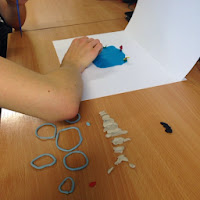Although stop-motion films are very interesting and looks very professional, it can take a very long time to create and finalise. For example, a single Wallace and Gromit film took up to five years to make. Some stop-motion films, like 'Coraline' have other design aspects (like CGI (computer generated imagery)) added to them to make them look better.
So in class we were put into small groups and told that we had two hours to create a short stop-motion film using modelling clay or Play-Doh. In my group we decided to make a baby seal that, unfortunately, gets eaten by a shark.
I thought that this was quite a fun, yet challenging task and once we got our idea it was straight into modelling and taking pictures.
We started off by making 3D models of the shark and the seal, as well as creating water ripples (the rings) and the water/sea that the mammals would feature in. After that we had to cut up the models so that they could be placed into shot piece-by-piece, making it look like they were appearing out of the water, or sliding into it.
As we started to assemble each animal in the water, we took a picture; building them up as the animals got bigger. The end result was a short video of the pictures stringed together, showing the movement of these two animals.




You know your projects stand out of the herd. There is something special about them. It seems to me all of them are really brilliant! t-com-haus.de
ReplyDeleteFrom simple character movements to complex mechanical animations, animation rigging is the key to making it all happen seamlessly.
ReplyDeleteThis comment has been removed by the author.
ReplyDelete